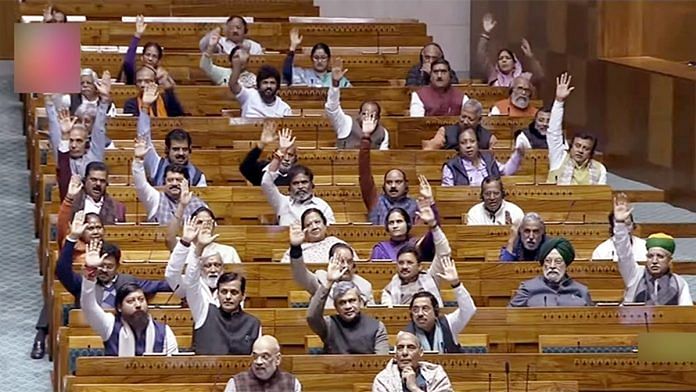New Delhi: The Lok Sabha Wednesday passed the three criminal law bills which seek to replace the Indian Penal Code (IPC), 1860; the Code of Criminal Procedure (CrPC), 1973 and the Indian Evidence Act, 1872.
The government had introduced the three bills, namely The Bharatiya Nyaya (Second) Sanhita 2023, The Bharatiya Nagarik Suraksha (Second) Sanhita 2023 and The Bharatiya Sakshhya (Second) Bill 2023, in August. They were then referred to the parliamentary standing committee on Home Affairs, which recommended more than 50 changes in the bills.
As a result, the government withdrew the three bills and reintroduced revised drafts in the Lower House, which were then passed Wednesday.
Here, ThePrint looks at some key aspects of the Bharatiya Nyaya (Second) Sanhita 2023, particularly how it defines the act of terrorism, and deals with sedition, bestiality and ‘unauthorised’ publication of court proceedings.
Definition of ‘terrorist act’
The Bharatiya Nagarik Suraksha (Second) Sanhita 2023 seeks to provide for the definition of a “terrorist act”, which so far was defined by Section 15 of the Unlawful Activities (Prevention) Act 1967. The earlier draft of the bill was criticised for introducing new elements to the offence.
For instance, while it classified any act that intends to threaten ‘the unity, integrity and security of India’ as a terrorist act, it also included acts intending to, amongst other things, ‘intimidate’ any segment of the public or ‘disturbing public order’.
In its report on the three new criminal law bills, the House panel on Home Affairs had recommended that the term ‘intimidation’ be explained clearly to settle the ambiguity in categorising an act as a ‘terrorist act’.
The new bill removes the element of intimidation altogether and offers a definition similar to the one already provided under UAPA.
An explanation to the section says that before registering a criminal case or an FIR under this clause, there has to be an approval by a senior police officer to decide whether the FIR should be registered under UAPA or under the new law. However, it does not provide any guidance on the basis on which the police officer should make this decision.
This may lead to different trial procedures for similar offences. For instance, while cases under UAPA are tried under the National Investigation Agency Act, 2008, which establishes special courts to try such cases, under the new bill, the same offence will be tried in the sessions court.
The definition of a ‘terrorist act’ has been contentious, and was even read down by the Delhi High Court in its order granting bail to Pinjra Tod activists Devangana Kalita and Natasha Narwal, and Jamia Millia Islamia student Asif Iqbal Tanha, in June 2021.
Delhi Police was quick to challenge this order in the Supreme Court, taking objection to the high court’s observations on Section 15 of the Act. Within three days, on 18 June 2021, the apex court put the high court order on hold to the extent that the latter’s opinion on UAPA was made inoperative.
However, in May this year, the top court dismissed the Delhi Police’s petition, while observing that the high court’s interpretations cannot be utilised by any other court.
Also Read: Police, judicial custody & use of handcuffs — how new bills may make criminal laws harsher
Sedition law
Section 124A of the IPC makes it a crime for anybody to incite or attempt to incite “hatred or contempt”, or excite “disaffection” towards the government. This provision applies to spoken or written words, signs or visible representation and provides for a three-year jail term or fine, or life imprisonment.
In May last year, the Supreme Court put on hold all pending trials, appeals and proceedings, with respect to charges under the sedition law till the Union government completed its exercise in re-examining its provisions.
While the new bill, BNS-II, does not use the word “sedition”, it does add a provision — Section 152 — penalising acts endangering sovereignty, unity and integrity of India.
It provides for punishment of seven-year jail term or life imprisonment for anybody who excites or attempts to excite “secession or armed rebellion or subversive activities, or encourages feelings of separatist activities or endangers sovereignty or unity and integrity of India”.
Besides spoken or written words, or signs or visible representation, this will also apply to electronic communication or by use of financial means.
Bestiality
The House panel in its report also noted that members as well as several stakeholders expressed objection to Section 377 of the IPC being completely omitted from the text of the Bharatiya Nyaya Sanhita 2023.
The Supreme Court, in the Navtej Singh Johar judgment, struck down Section 377 of the Indian Penal Code to the extent that it criminalised same-sex relations between consenting adults.
“The Committee understands that the unnatural sex which was an offence under section 377, IPC has been read down by the Supreme Court, but non-consensual sexual acts of unnatural order are still prosecuted under this section,” read the House panel report.
It asserted that several members were of the view that the remaining part of section 377, which is still valid, should be retained in the Bharatiya Nyaya Sanhita, appropriately.
The committee observed that provisions of Section 377 “remain applicable in cases of non-consensual carnal intercourse with adults, all acts of carnal intercourse with minors, and acts of bestiality”.
The Bharatiya Nyaya (Second) Sanhita 2023 too does not contain any provision for non-consensual sexual offence against male, female, transgender, and for bestiality.
‘Unauthorised’ publication of court proceedings
Section 73 of The Bharatiya Nyaya (Second) Sanhita 2023 criminalises printing or publishing “any matter” concerning court proceedings in rape or sexual assault cases without prior permission from the court.
It provides for a two-year jail term and fine for violating the law.
An explanation attached to the provision, however, explains that the printing or publication of any high court or Supreme Court judgment shall not be an offence.
(Edited by Amrtansh Arora)



